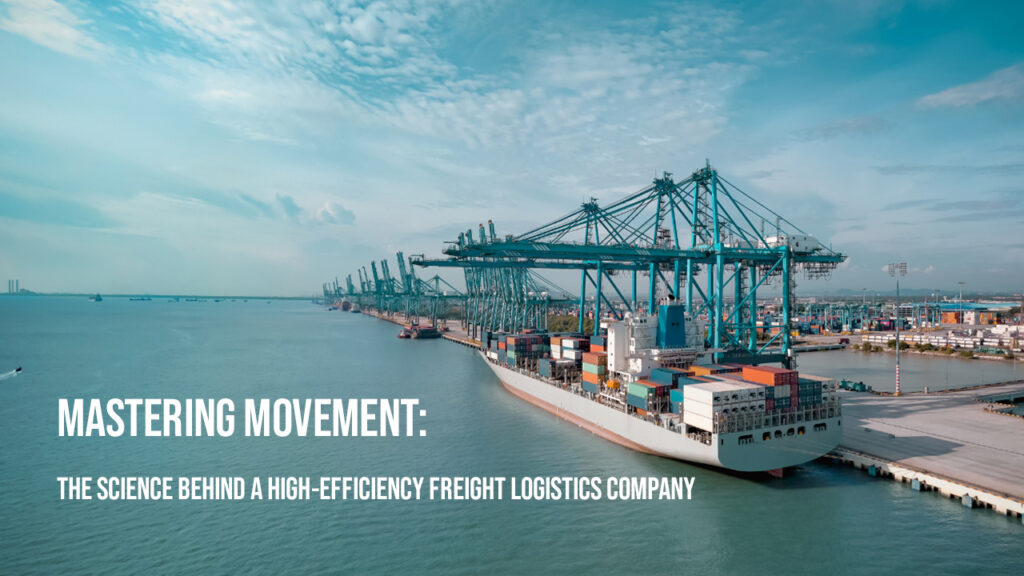In a world where the seamless movement of goods is paramount, freight logistics companies are at the forefront of ensuring that products reach their destinations efficiently. These companies are the unsung heroes of the global economy, responsible for the intricate choreography of shipping, tracking, and delivering goods. The key to their success lies in mastering the science behind high-efficiency logistics. In this article, we will delve into the world of freight logistics, exploring the technologies and strategies that underpin their operations, and how they manage to outperform the competition.
The Foundation of Freight Logistics
The Role of Data Analytics
At the heart of every high-efficiency freight logistics company is data analytics. These companies utilize cutting-edge technology to gather, process, and analyze an immense amount of data. This data encompasses everything from the weight and dimensions of shipments to weather forecasts, traffic patterns, and customer demands. By harnessing the power of big data, logistics companies can make informed decisions that lead to quicker deliveries, reduced costs, and improved customer satisfaction.
Route Optimization
Efficient routing is the linchpin of freight logistics. Using sophisticated algorithms, companies can determine the most time and cost-effective routes for shipments. This not only saves money but also reduces carbon emissions, making it an environmentally friendly choice.
Inventory Management
Maintaining optimal inventory levels is crucial for a logistics company. It’s a delicate balancing act. Keeping too much inventory on hand ties up capital, while keeping too little can result in stockouts and unhappy customers. High-efficiency logistics companies employ inventory management systems that constantly monitor inventory levels and reorder products as needed, optimizing the balance between supply and demand.
Cutting-Edge Technologies
IoT and Real-Time Tracking
The Internet of Things (IoT) has revolutionized the logistics industry. Freight containers equipped with sensors can relay real-time information about their location, temperature, and condition. This level of transparency allows logistics companies to closely monitor shipments, address issues promptly, and provide customers with accurate delivery times.
Autonomous Vehicles
The future of freight logistics is undoubtedly autonomous vehicles. Self-driving trucks and drones are being tested and used in some areas to reduce human error and labor costs. These vehicles are equipped with advanced sensors and AI to navigate and deliver goods safely and efficiently.
Blockchain for Transparency
Blockchain technology has found its way into the logistics sector, bringing unparalleled transparency and security to the supply chain. It ensures that all parties involved in a shipment can access the same information, reducing disputes, fraud, and inefficiencies.
Environmental Sustainability
Green Initiatives
High-efficiency logistics companies are increasingly focusing on environmental sustainability. They’re reducing their carbon footprint by adopting electric or hybrid vehicles, optimizing routes to minimize fuel consumption, and even exploring alternative fuels such as hydrogen.
Packaging Innovations
Freight logistics companies are also keen on reducing waste and minimizing the environmental impact of packaging. They’re investing in sustainable packaging materials and designs to reduce their ecological footprint.
The Human Element
Skilled Workforce
Behind all the technology and innovations, a skilled and dedicated workforce is essential. Logistic professionals, from drivers to warehouse staff, are the backbone of the industry. Their expertise in managing, tracking, and delivering goods is invaluable.
Customer-Centric Approach
Customer satisfaction is paramount. High-efficiency logistics companies prioritize a customer-centric approach, providing real-time updates, transparent pricing, and responsive customer service to ensure a positive experience for their clients.
Conclusion
In the realm of high-efficiency freight logistics, science and technology play pivotal roles. Data analytics, route optimization, IoT, autonomous vehicles, and blockchain are revolutionizing the industry. Moreover, environmental sustainability is a growing concern, prompting logistics companies to adopt green initiatives and packaging innovations. However, it’s important to remember that behind every successful freight logistics operation is a skilled workforce and a commitment to customer satisfaction. Mastering movement in the world of logistics is not just about the science; it’s also about the people who make it happen.

